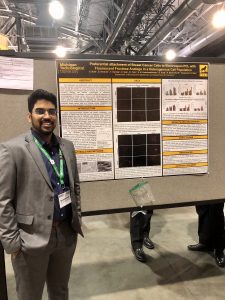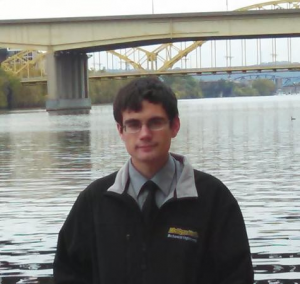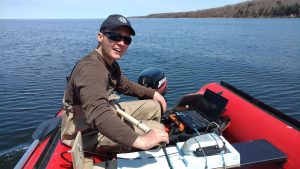

Advancement to candidacy is a major milestone for doctoral students. PhD students who have advanced to candidacy are deemed to have completed all formal requirements of their program, except the dissertation. Advancement to candidacy is an acknowledgment that the student is ready to undertake independent dissertation research and has the potential to successfully complete their PhD program. Formal requirements vary by program, they generally take two to three years after starting the program and include coursework, qualifying exams, and research proposal. To celebrate this milestone, the Graduate School at Michigan Tech has introduced a new tradition to recognize, applaud and celebrate doctoral students who attain this feat.
This new tradition will take the form of a ceremony that brings together candidates, their advisors and their families in celebration of students who have advanced to this stage in their studies. Candidates will be presented with certificates at the ceremony.
Commenting on this new tradition, Graduate School Dean Pushpa Murthy said, “The advancement to candidacy is a major milestone in PhD programs, it is an acknowledgment by the program that the PhD student has acquired the necessary advanced knowledge of the subject and demonstrated the ability to conduct research necessary for a dissertation.”
To be eligible for participation in this ceremony, doctoral students should have submitted the Petition to Enter Candidacy form. This form is submitted once the student has fulfilled the following requirements:
- Submitted an approved degree schedule • Completed all relevant courses and course credits
- Completed Basic and Advance RCR Training
- Passed qualifying exams
- Passed research proposal exams
- Formed an advisory committee
Planning for the debut ceremony, which is scheduled for Feb. 26, is ongoing. More information about the new tradition and ceremony will be coming soon.
Avik Ghosh
Biochemistry and Molecular Biology
 I joined Dr. Tanasova’s Lab as a PhD student in the Department of Biochemistry and Molecular Biology in Fall 2017. My research focuses on exploring the impact of nutritional deprivation in cancer cells. Nutritional deprivation has been of interest to the research community as an approach to sensitize cancer cells towards chemotherapy. While many strategies have been undertaken, it is still not clear whether such an approach can be safely applied to all types of cancers. As a researcher in the Tanasova laboratory, I am aiming to understand the outcomes of fructose deprivation in different cancer types.
I joined Dr. Tanasova’s Lab as a PhD student in the Department of Biochemistry and Molecular Biology in Fall 2017. My research focuses on exploring the impact of nutritional deprivation in cancer cells. Nutritional deprivation has been of interest to the research community as an approach to sensitize cancer cells towards chemotherapy. While many strategies have been undertaken, it is still not clear whether such an approach can be safely applied to all types of cancers. As a researcher in the Tanasova laboratory, I am aiming to understand the outcomes of fructose deprivation in different cancer types.
Our recent development of fluorescent probes that can specifically target cancer-relevant fructose transporter GLUT5 made it possible to conduct targeted studies on assessing the role of this transporter in cancer. Through preliminary assessments, I have found that depriving cancer cells in fructose through GLUT5 inhibition induces different responses in different cancer types. I discovered that in aggressive breast cancer phenotypes, such deprivation causes long-term stress that could positively contribute to the outcome of chemotherapy. In contrast, at an early stage, cancer cells appear to adjust to the induced deprivation and gain resistance. This observed difference provides an essential insight into the diverse nature of cancer and allows us to rationalize the choices of treatment better.
However, considering a required high-level experimental rigor, I still need to perform a large number of experiments that will validate the discovery from different angles. The work will include couple of challenging analyses that are known to be time-consuming and require tuning of conditions to achieve results.
Thus, I sincerely thank Portage Health Fellowship for the support. The award has not only taken care of my tuition/stipend support but also has bought me time from my daily teaching responsibilities to focus on my research better. I would also like to thank my advisor Dr. Marina Tanasova and the Department of Biochemistry and Molecular Biology for the constant support and guidance.
Pegah Kord Forooshani
Biomedical Engineering
 I joined Dr. Bruce Lee’s lab in the Department of Biomedical Engineering in Fall 2016, where we focused on designing biomimetic materials for different biomedical applications. The overall objective of my research is to manipulate a unique reduction-oxidation chemistry found in mussel adhesive proteins to create novel biomimetic model systems for robust antibacterial activity and enhanced wound healing. Specifically, I have been developing biomimetic hydrogel/microgels which can be activated to release Reactive Oxygen Species such as hydroxyl radical (OH˙) and hydrogen peroxide (H2O2). OH˙ is an extremely potent oxidizer which, unlike H2O2, no known enzyme can detoxify it in the bacteria cells, leading to fast and efficient antibacterial activities. H2O2 is a mild oxidizer, which effectively functions as a broad-spectrum biocide and disinfectant in many biomedical applications. The biological responses to H2O2 are highly dependent on its concentration. The introduction of a relatively high concentration of H2O2 is antimicrobial and a relatively lower concentration promoted wound healing. We are anticipating that our H2O2-releasing hydrogels can serve as a simple and inexpensive approach for the treatment of healing-impaired wounds such as diabetic foot ulcers.
I joined Dr. Bruce Lee’s lab in the Department of Biomedical Engineering in Fall 2016, where we focused on designing biomimetic materials for different biomedical applications. The overall objective of my research is to manipulate a unique reduction-oxidation chemistry found in mussel adhesive proteins to create novel biomimetic model systems for robust antibacterial activity and enhanced wound healing. Specifically, I have been developing biomimetic hydrogel/microgels which can be activated to release Reactive Oxygen Species such as hydroxyl radical (OH˙) and hydrogen peroxide (H2O2). OH˙ is an extremely potent oxidizer which, unlike H2O2, no known enzyme can detoxify it in the bacteria cells, leading to fast and efficient antibacterial activities. H2O2 is a mild oxidizer, which effectively functions as a broad-spectrum biocide and disinfectant in many biomedical applications. The biological responses to H2O2 are highly dependent on its concentration. The introduction of a relatively high concentration of H2O2 is antimicrobial and a relatively lower concentration promoted wound healing. We are anticipating that our H2O2-releasing hydrogels can serve as a simple and inexpensive approach for the treatment of healing-impaired wounds such as diabetic foot ulcers.
I would like to thank Dr. Lee for all of his valuable guidance and support which have provided me with the opportunity to expand my knowledge and skills. I am also incredibly grateful to the Portage Health Foundation for awarding me this assistantship which will enable me to concentrate on my research and complete my doctoral project.
Mingyang Li
Mechanical Engineering- Engineering Mechanics
 I am a Ph.D. candidate studying design for reliability in the Department of Mechanical Engineering-Engineering Mechanics. In Fall 2014, I came to Michigan Tech as a master student in Material Science and Engineering department, and Dr. Yu Wang was my advisor for the research regarding ferroelectric materials. I joined MEEM to pursue Ph.D. after finishing my master degree in 2016. Fortunately, I decided to work with Dr. Zequn Wang, and our research interests are mainly focused on reliability analysis, uncertainty quantification, and machine learning techniques. During the past three years, we have done lots of work for improving the efficiency and accuracy of reliability analysis, and deep learning methods have been integrated for dealing with the curse of dimensionality.
I am a Ph.D. candidate studying design for reliability in the Department of Mechanical Engineering-Engineering Mechanics. In Fall 2014, I came to Michigan Tech as a master student in Material Science and Engineering department, and Dr. Yu Wang was my advisor for the research regarding ferroelectric materials. I joined MEEM to pursue Ph.D. after finishing my master degree in 2016. Fortunately, I decided to work with Dr. Zequn Wang, and our research interests are mainly focused on reliability analysis, uncertainty quantification, and machine learning techniques. During the past three years, we have done lots of work for improving the efficiency and accuracy of reliability analysis, and deep learning methods have been integrated for dealing with the curse of dimensionality.
I am extremely grateful to the Graduate School for the award of Doctoral Finishing Fellowship, which ensures that I can fully devoted myself to my dissertation and complete my degree within next semester. I would like to thank the guidance from my master and Ph.D. advisors. I cannot achieve my goals without the massive support from them.
Samerender Nagam Hanumantharao
Biomedical Engineering
 I moved to the city of Houghton to pursue my M.S. degree in Biomedical Engineering in Fall 2015. I completed my Masters’ thesis, titled “ A 3D Biomimetic Scaffold using Electrospinning for Tissue Engineering Applications” under the guidance of Dr. Smitha Rao in Spring 2017. I continued to work with Dr. Rao in pursuit of my Ph.D. My PhD work focuses on understanding and exploiting the role of biomechanical cues in chronic wound healing and cancer. Interestingly, these two diseases share some common factors that can be used to make bandages that can accelerate wound healing or trap metastatic cancer cells. I want to thank the Graduate School for the funding during the last stage of my research.
I moved to the city of Houghton to pursue my M.S. degree in Biomedical Engineering in Fall 2015. I completed my Masters’ thesis, titled “ A 3D Biomimetic Scaffold using Electrospinning for Tissue Engineering Applications” under the guidance of Dr. Smitha Rao in Spring 2017. I continued to work with Dr. Rao in pursuit of my Ph.D. My PhD work focuses on understanding and exploiting the role of biomechanical cues in chronic wound healing and cancer. Interestingly, these two diseases share some common factors that can be used to make bandages that can accelerate wound healing or trap metastatic cancer cells. I want to thank the Graduate School for the funding during the last stage of my research.
Zachary Morgan
Materials Science & Engineering
 Specializing in computational materials research as a Ph.D. student, I am motivated by opportunities where I can utilize knowledge of numerical analysis, scientific visualization, and data processing to investigate problems in materials science. I have had many opportunities to grow as a professional in research, teaching, and volunteering here at Michigan Tech which has given me a fulfilling experience. Currently, I am working on modeling and simulation of defects in materials under the influence of driving forces due to harsh and extreme conditions including electric fields and stresses. I develop my own software that allows me to investigate these interesting problems. A special thank you is given to my advisor Dr. Yongmei Jin for all of her wonderful support and encouragement. Additionally, I’d like to thank the Department of Materials Science and Engineering here at Tech. I am grateful to the Graduate School for its support through the Finishing Fellowship.
Specializing in computational materials research as a Ph.D. student, I am motivated by opportunities where I can utilize knowledge of numerical analysis, scientific visualization, and data processing to investigate problems in materials science. I have had many opportunities to grow as a professional in research, teaching, and volunteering here at Michigan Tech which has given me a fulfilling experience. Currently, I am working on modeling and simulation of defects in materials under the influence of driving forces due to harsh and extreme conditions including electric fields and stresses. I develop my own software that allows me to investigate these interesting problems. A special thank you is given to my advisor Dr. Yongmei Jin for all of her wonderful support and encouragement. Additionally, I’d like to thank the Department of Materials Science and Engineering here at Tech. I am grateful to the Graduate School for its support through the Finishing Fellowship.
Olivia Barbee
Geology
 I am a Ph.D. Candidate studying igneous petrology in the Department of Geological and Mining Engineering and Sciences. I conduct crystal-scale studies of magmatic minerals primarily within a voluminous eruption deposit from Toba caldera volcano in Indonesia. Before eruption, these minerals were recording the evolving conditions of their subsurface environment as they were growing (crystallizing) from the magma. I decipher their preserved records, similar to how one studies tree rings. I specifically link changes in crystal texture with changes in crystal chemistry to better understand magma dynamics in potentially hazardous, caldera-forming magma systems (e.g., Toba, Yellowstone, Taupo Volcanic Zone). My findings have important implications for the application of petrologic tools used to study magmas, such as mineral geothermometers, geobarometers and geospeedometers, as well as models of caldera magma systems. My research may also help inform timescales of the production and gestation of giant silicic magma bodies stored in the Earth’s crust, whose eruptions are known to have global impacts.
I am a Ph.D. Candidate studying igneous petrology in the Department of Geological and Mining Engineering and Sciences. I conduct crystal-scale studies of magmatic minerals primarily within a voluminous eruption deposit from Toba caldera volcano in Indonesia. Before eruption, these minerals were recording the evolving conditions of their subsurface environment as they were growing (crystallizing) from the magma. I decipher their preserved records, similar to how one studies tree rings. I specifically link changes in crystal texture with changes in crystal chemistry to better understand magma dynamics in potentially hazardous, caldera-forming magma systems (e.g., Toba, Yellowstone, Taupo Volcanic Zone). My findings have important implications for the application of petrologic tools used to study magmas, such as mineral geothermometers, geobarometers and geospeedometers, as well as models of caldera magma systems. My research may also help inform timescales of the production and gestation of giant silicic magma bodies stored in the Earth’s crust, whose eruptions are known to have global impacts.
I thank my advisor, Dr. Chad Deering, for his generous support, and allowing me to explore various research avenues throughout my time at Michigan Tech. I am also indebted to Dr. Craig Chesner, a long-time mentor and Michigan Tech Alumni (M.S.; Ph.D. ’88), as his Toba research at Tech led me to where I am today (and ironically, back to where it all started). I am very grateful to the Graduate School for their support through a Doctoral Finishing Fellowship, which will allow me to finish writing my dissertation and research publications.
Karl Meingast
Forest Science
 My M.S. research project was focused on peatland fuel characterization using remotely sensed data and was published in Remote Sensing of the Environment. After that, my research focus shifted to organic matter movement from terrestrial inputs (leaf litter for example) to Lake Superior through snowmelt flushing. This research is in line with the NASA Arctic COLORS project focused on similar questions in the Bering, Chukchi Seas and Beaufort Seas. These questions have led our team to employ in-situ validations of remotely sensed data, land and boat based field studies of Lake Superior, and laboratory tests to answer our main research question: How do snowpack and soil water flowpath dynamics affect dissolved carbon exports from forested watersheds? After publishing my dissertation, I look forward to continuing research focused on these questions; however, I am very passionate about Lake Superior, and I look forward to engaging in new and ongoing research opportunities related to geographic, biological, physical, and chemical questions associated with it.
My M.S. research project was focused on peatland fuel characterization using remotely sensed data and was published in Remote Sensing of the Environment. After that, my research focus shifted to organic matter movement from terrestrial inputs (leaf litter for example) to Lake Superior through snowmelt flushing. This research is in line with the NASA Arctic COLORS project focused on similar questions in the Bering, Chukchi Seas and Beaufort Seas. These questions have led our team to employ in-situ validations of remotely sensed data, land and boat based field studies of Lake Superior, and laboratory tests to answer our main research question: How do snowpack and soil water flowpath dynamics affect dissolved carbon exports from forested watersheds? After publishing my dissertation, I look forward to continuing research focused on these questions; however, I am very passionate about Lake Superior, and I look forward to engaging in new and ongoing research opportunities related to geographic, biological, physical, and chemical questions associated with it.
Di Huang
Materials Science & Engineering
 I am a Ph.D. candidate in Material Science and Engineering, working with my advisor, Dr. Jiann-Yang Hwang. Over the past four years, my research interest has been focused on ion exchange membranes, which play important roles in desalination and purification industry. Ion exchange membranes that are more related to my research is the industrial wastewater treatment. Studying the high-performance ion exchange membranes helps to solve the excessive water pollution issue, such as wastewater of plating industry. The synthesis method implemented in my research can appropriately decrease the production cost of ion exchange membranes applied for treating wastewater with high heavy metal ions. Furthermore, this ion exchange membrane would better save electrical energy for electrochemical device which were widely used in wastewater retreatment field.
I am a Ph.D. candidate in Material Science and Engineering, working with my advisor, Dr. Jiann-Yang Hwang. Over the past four years, my research interest has been focused on ion exchange membranes, which play important roles in desalination and purification industry. Ion exchange membranes that are more related to my research is the industrial wastewater treatment. Studying the high-performance ion exchange membranes helps to solve the excessive water pollution issue, such as wastewater of plating industry. The synthesis method implemented in my research can appropriately decrease the production cost of ion exchange membranes applied for treating wastewater with high heavy metal ions. Furthermore, this ion exchange membrane would better save electrical energy for electrochemical device which were widely used in wastewater retreatment field.
am extremely honored to be awarded the finishing scholarship and very grateful to have this support during this stage of my research. This fellowship provides me precious time and energy to focus on my final dissertation and allows me equipping myself to start the next stage of my career.